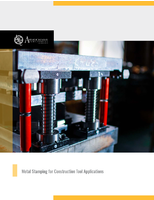Network Analyzers (Electrical)
Analyzer offers interoperability verification for RPR.
Share:
Press Release Summary:
OmniBER test solution provides device design and interoperability verification for IEEE 802.17 Resilient Packet Ring (RPR) and Generic Framing Procedure (GFP) for Multi-Service Platforms (MSPs). Available up to 2.5 and 10 Gbps, respectively, models J7233A and J7233B test hardware, software, and system level performance of RPR encapsulated in GFP and carried over SONET/SDH. Scalable to 40 Gbps, products perform functional and jitter conformance testing.
Original Press Release:
Agilent Technologies' OmniBER First to Offer Design, Interoperability Verification for RPR over SONET/SDH via GFP
Analyzer ensures device interoperability and IEEE 802.17 compliance for RPR-enabled equipment
ANAHEIM, Calif., OFC/NFOEC, Booth No. 2901, March 11, 2005
Agilent Technologies Inc. (NYSE: A) today announced the industry's first test solution to provide device design and interoperability verification for both IEEE 802.17 Resilient Packet Ring (RPR) and Generic Framing Procedure (GFP) for Multi-Service Platforms (MSPs). The addition of RPR to Agilent's OmniBER communications performance analyzers enables chipset designers, network equipment manufacturers (NEMs) and service provider labs to verify RPR chipsets and RPR-enabled devices more quickly, accelerating service deployment.
New network equipment with new protocols for carrying the triple play of voice, video and data traffic must be thoroughly tested to ensure high reliability. RPR supports the transportation of triple-play services over SONET and in metro networks, and it was recently standardized by IEEE 802.17 in September 2004. The key benefits of RPR include increased bandwidth efficiency, support for class of service features, carrier class protection and high scalability.
"One of the most interesting trends in this market is RPR, which is growing at a phenomenal rate," said Michael Howard, principal analyst of Infonetics Research. "Worldwide RPR revenue hit $323 million in 2003, and we project it to grow 200 percent to $967 million by 2007, a compound annual growth rate of 32 percent. Service providers are figuring in RPR over SONET/SDH plans much more now than they were even six months ago. In fact, 63 percent now plan to offer Ethernet services over RPR in the next few years."
The Agilent OmniBER is the only test instrument to combine both RPR and GFP measurements along with comprehensive coverage of virtual concatenation (VCat), Ethernet payloads and Link Capacity Adjustment Scheme (LCAS) used in next-generation SONET/SDH (NG SONET). The OmniBER's RPR and GFP measurement capabilities allow users to thoroughly test hardware, software and system level performance of RPR encapsulated in GFP and carried over SONET/SDH, the most common method used by MSPs.
The OmniBER with RPR combines all of the following measurements in one instrument:
Hardware verification and interoperability verification of RPR/GFP enabled SONET/SDH devices ensures device compatibility and interoperability with the IEEE 802.17 RPR standard.
The most comprehensive NG SONET test capability, including GFP, high- and low-order VCat, Ethernet payload, and LCAS measurement capabilities, as well as RPR, provides insight into all protocol layers helping to identify connectivity issues.
Advanced analysis capabilities for RPR help ensure standards conformance and quality of service (QoS), and help resolve multi-vendor interoperability problems for RPR features such as fairness of class of service delivered.
Using the encapsulation analyzer, deep insight is provided into device behavior with capture and analysis of RPR signal structures down to byte level, enabling complete capture, decode, and display of RPR frames. Capture triggers provide the ability to select and analyze the exact frames of interest for detailed problem isolation.
RPR frame extraction from SONET/SDH framed GFP (GFP-F) signals, including VCat containers, allows designers to test operating networks in through mode and find and fix non-conformant designs under realistic operating conditions.
Stress testing of RPR devices ensures high reliability in a wide variety of operating and fault conditions during test.
"OmniBER's unique capability for checking compliance and interoperability of SONET/SDH MSPs to the IEEE 802.17 (RPR) standard has been eagerly awaited by our customers," said Dave Bass, general manager of Agilent's Data Networks Division. "Many leading NEMs, service providers and component manufacturers who have purchased OmniBERs with NG SONET capabilities can also easily upgrade to RPR capability."
About the Agilent OmniBER
The Agilent OmniBER is a second-generation RPR, NG SONET/SDH and jitter analyzer, scalable to 40 Gb/s, and is designed to have extremely low intrinsic jitter, a key enabler of greater measurement accuracy. The Agilent OmniBER provides both functional and jitter conformance testing in a single product.
More information about the Agilent OmniBER is available at www.agilent.com/comms/omniber. Product photos are available at www.agilent.com/find/omniber_image.
U.S. Pricing and Availability
The Agilent J7233A and J7231B OmniBER are available now at prices starting from $86,198. The J7233A OmniBER is available up to 2.5 Gb/s with RPR, NG SONET/SDH plus jitter. The J7231B OmniBER is available up to 10 Gb/s with RPR, NG SONET/SDH plus jitter.
About Agilent Technologies
Agilent Technologies Inc. (NYSE: A) is a global technology leader in communications, electronics, life sciences and chemical analysis. Agilent had net revenue of $7.2 billion in fiscal year 2004. Information about Agilent is available on the Web at www.agilent.com.
Contact:
Janet Smith, Agilent
+1 970 679 5397
janet_smith@agilent.com
Annie Lennon
Weber Shandwick, for Agilent
+1 503 552 3747
alennon@webershandwick.com




